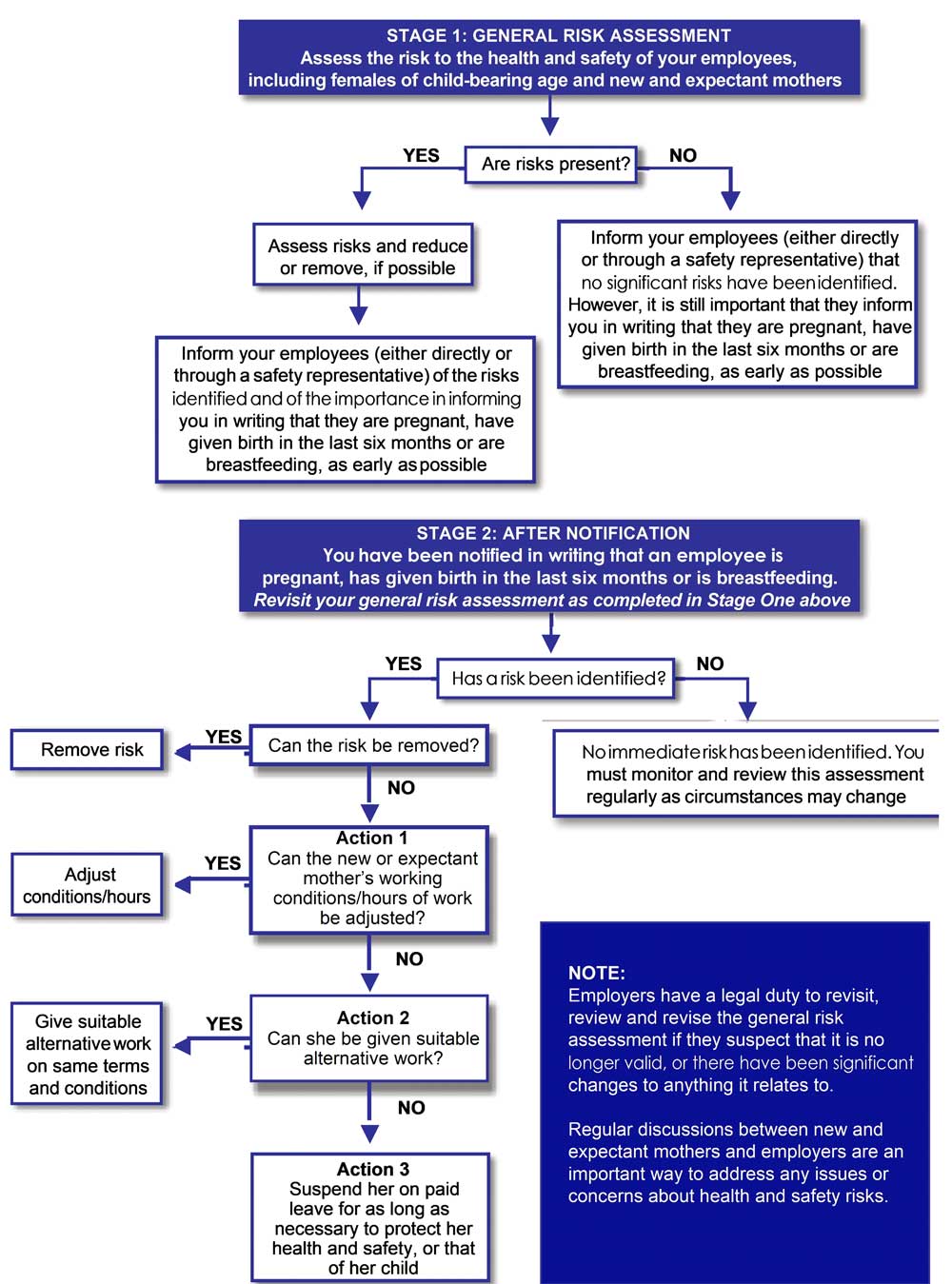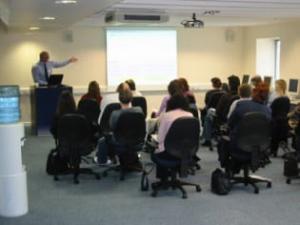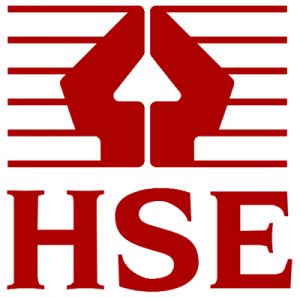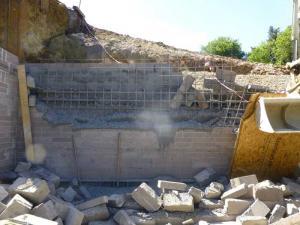New and Expectant Mothers: What you need to know
Last week I happened to call into a company’s office, they weren’t clients of ours and it wasn’t business related. However, in conversation it came out what I do for a living and one of them asked “Tell me, is it right that we should have facilities for pregnant women?”
After I answered their question, I realised that I have been asked similar questions about new and expectant mothers before so thought that it might be a good topic to cover in this week’s newsletter.
Each year more mothers are going back to work after having a baby. In 2017 there were 4.9 million mothers with dependent children in work, which is an increase of about one third from 3.67 million in 1996. Employers need to understand the key risks that need to be controlled to ensure a safe working environment for new and expectant mothers.
What specific regulations are there to protect new and expectant mothers’ health and safety?
Specific laws relating to new and expectant mothers at work are mainly contained in:
- Equality Act 2010: Any breach of health and safety legislation in relation to new and expectant mothers is considered automatic sex discrimination.
- Management of Health and Safety at Work Regulations 1999: The Regulations implement the health and safety requirements of the Pregnant Workers Directive (92/85/EEC) into UK law. The most relevant health and safety requirements relating to this topic are found in Regulations 16 to 18.
- Workplace (Health, Safety and Welfare) Regulations 1992: The Regulations require employers to provide suitable rest facilities for workers who are pregnant or breastfeeding. Preferably these would be located close to other conveniences like the toilets and have facilities for the new or expectant mother to lie down.
What sort of risks may new and expectant mothers face?
They may be at risk from processes, working conditions or physical, biological and chemical agents and these risks will vary depending on their health, and at different stages of their pregnancy. Some of the more common risks might be:
- Physical agents: movements and postures, manual handling, shocks and vibrations, noise, radiation (ionising and non-ionising), work in compressed air (for example in pressurised construction works) diving and underground mining work.
- Biological agents: infectious diseases.
- Chemical agents: toxic chemicals, mercury, antimitotic (cytotoxic) drugs, pesticides, carbon monoxide, lead. I remember many years ago visiting a factory, only to find a young lady about 7 months pregnant, working on a production line which involved the use of a special liquid. On reading the container of this liquid, which clearly stated that the contents could be “Harmful to an unborn child” I directed that this lady be moved away from this section and given work elsewhere in the factory. I also recommended that she was seen by a doctor to check that she and child were ok. But why was she allowed to be working there in the first place?
- Working conditions: lack of facilities (including rest rooms), mental and physical fatigue, working hours, stress (including post-natal depression), passive smoking, temperature, working with visual display units (VDUs), working alone, working at height, travelling, violence, personal protective equipment, nutrition.
Recommendations for employers
- Ensure that any risks to women of a child bearing age are assessed and managed.
- Create a policy for new and expectant mothers. WSG can help you with this.
- Assess the risks (individually) to new and expectant mothers and put control measures in place to manage the risk effectively. If risks cannot be managed, then a suitable alternative (at the same rate of pay) should be found. If neither of these are possible – then the woman should be suspended on full pay, to protect her and her baby. See next section about Risk Assessment
- Arrange a time for an induction or meeting to discuss risks with the new or expectant mothers and to hear any of her concerns.
- Ensure that risk assessments are kept under review to reflect the stages of pregnancy and after birth.
- Make space for a rest facility or breast pumping area (it should be quiet, clean and comfortable).
- Give new and expectant mothers as much information to help them understand any processes
Carrying out the relevant Risk Assessments
As part of your general duties as an employer you must inform any new and expectant mothers about the preventative and protective measures implemented to reduce, remove or control risk. You may revisit your original risk assessment to identify if there is anything else you need to do to make sure either the expectant mother or her baby is not exposed to risk.
It is important that they tell you about any advice they have had from their doctor or midwife (e,g: pregnancy-related medical conditions such as high blood pressure, a history of miscarriages etc) as that could affect the assessment. You must use this information to review your risk assessment and if necessary, to adjust her working conditions accordingly.
You are also obliged to show the new or expectant mother the outcome of the risk assessment.
The following flowchart outlines the action you must take to do this.

Some relevant case law
EasyJet
Two EasyJet Flight attendants brought a claim to an Employment Tribunal against EasyJet after the company to offer arrangements that they considered appropriate to enable them to continue breast feeding when they returned to work following maternity leave.
The women had asked for shorter shift hours, of eight hours, to allow them to express milk after their shifts.
The Employment Tribunal found that EasyJet had provided several unworkable options, each of which involved the women suffering a significant detriment. It held that EasyJet had discriminated against the claimants indirectly on grounds of their sex and that EasyJet should have reduced the breastfeeding mothers’ hours, found them alternative duties or suspended them on full pay.
Both were awarded damages, one of £11,620.82 and the other £20,904.15. These were made up of interest, loss of earnings and four days’ pay for attending the tribunal.
If you would like any further help or support, please please contact us by phone 01458 253682, email or via our Facebook page or by Twitter.
Taunton & Somerset CPD Group at The Exchange House Taunton
Please remember that we now run these CPD events at the Exchange House, 12 – 14 The Crescent, Taunton TA1 4EB on a fortnightly basis.
The next of the CPD events is listed below.
As previously requested, if you could let us know whether or not you can attend it would be greatly appreciated. Also, if you would like to give a talk, or know of somebody who would, please contact Jon at [email protected]
Our next Seminar will be on Wednesday 27th March 2019. Could you please arrive by 12:30pm prompt.
Our speaker for this one is Jeremy Miles of Geogrow will talk about Vegetated Retaining Wall Systems.
If you haven’t already booked your place, or if you are not on the CPD Seminar mailing list but would like to be please drop Jon an email and he will deal with your request.
As per our last one if you could let Jon know whether or not you can attend within 7 days of receipt of his email, it would be greatly appreciated.
Contact Details [email protected]. 07831 714199 or 01458 253682.
*Early notice of 10th April meeting. Peter Bushnell of The Wilkins Safety Group will talk about What are the benefits of ISO 45001?
For more details about these and the other forthcoming CPD talks please see cpds to 24th April 2019
Training Courses
We shall be running more new courses again in 2019 and the dates and details of forthcoming courses will be published here each week.
But remember we are still available for running “In House” courses and are looking to add new training courses to our list.
If you have any questions about these courses or any other training or would like us to run a particular course for you, call Jon Wilkins of the Wilkins Safety Group on 01458 253682 or email him at [email protected]
Fine after boy was electrocuted
£2.7 million fine after boy was electrocuted
Rail freight company DB Cargo (UK) Ltd has been fined £2.7 million, with £188,873.89 costs,  following an incident in which a 13-year-old boy suffered life-changing injuries after receiving an electric shock from 25,000-volt overhead line equipment at Tyne Yard in Gateshead.
following an incident in which a 13-year-old boy suffered life-changing injuries after receiving an electric shock from 25,000-volt overhead line equipment at Tyne Yard in Gateshead.
On 14 June 2014 two boys, aged 11 and 13, and two 13-year-old girls entered Tyne Yard. The two boys climbed on top of a stationary wagon, part of a 22-wagon train due to leave the yard later that day. While on the wagon one of the boys made contact with the live current and suffered serious life changing injuries as a result, the other boy received minor burns.
The Office of Rail and Road (ORR) investigation found that trespassers often visited a disused signal box at the yard, known as the ‘haunted house’, as DB Cargo failed to ensure that non-employees were not exposed to risks to their health and safety through its activities.
Sentence was passed at Newcastle Crown Court where DB Cargo was found guilty on 5 October 2018 following the ORR prosecution.
DB Cargo (UK) Ltd also pleaded guilty at the conclusion of the trial to a single count of contravention of a requirement to produce information under s.20 of the Health and Safety at Work etc Act 1974. A request was made for documentation from the defendant by one of ORR’s Inspectors and that request was refused. DB Cargo was fined £33,500 for that offence.
DB Cargo (UK) Ltd Limited was found guilty of failing to discharge its duty under Section 3(1) of the Health and Safety at Work etc Act 1974 and was therefore guilty of an offence contrary to Section 33(1)(a) of the Act.
Ian Prosser, HM Chief Inspector of Railways, said:
“Our thoughts remain with the victim who suffered such awful injuries, the other children injured and traumatised, and also their families and friends who will have been deeply affected by this harrowing incident.
“We welcome the sentence which clearly indicates the seriousness with which this offence is viewed and we expect DB Cargo and the rail industry as a whole to look very hard at their sites and make sure they are doing everything possible to ensure they are secure. This incident is a reminder to adults and children that railway sites can have many dangers, often not obvious, and that trespass on railway premises can lead to serious injuries.”
Building firm fined £900,000
Building firm fined £900,000 after fatal wall collapse.
A company has been fined £900,000 after the death of an employee who died from head injuries when a wall collapsed on a construction site at Lyme Regis.
Bournemouth Crown Court heard how, on 2 June 2015, Thomas Telfer was working as a bricklayer employed by Capstone Building Ltd, when he was struck by falling masonry after a retaining wall failed as it was being back filled with concrete.
An investigation by the Health and Safety Executive found that the company had failed to appropriately manage the work that was being carried out at the site at Chatterton Heights, Lyme Regis and failed to ensure the health, safety and welfare of employees on site, including Thomas Telfer.
Capstone building Limited, which is in administration, were found guilty after a trial to breaching Section 2 and Section 3 of the Health and Safety at Work Etc Act 1974, were fined £900,000 and ordered to pay costs of £60,336.99.
Speaking after the hearing, HSE inspector Ian Whittles said:
“This tragic incident could so easily have been avoided if the appropriate measures were in place to provide a safe working practice.
“Companies should be aware that HSE will not hesitate to take appropriate enforcement action against those that fall below the required standards.”
Remember
Unlike other organisations who send out newsletters giving you a little titbit of information, then stating that if you want to follow the full link or read the full story or get more information you must pay to subscribe to their service.
- Our newsletter service is FREE,
- The links we supply are FREE,
- The helpline advice is FREE.

If you find this newsletter service of use and you think others might also find it useful, then kindly pass it on and ask them to subscribe for free, so they can continue to receive it in their own right.
Also contact us if you have a particular health and safety subject or question you would like covered
If you have any queries on any health and safety matter, please contact Jon Wilkins on 01458 253682 or by email on [email protected]


